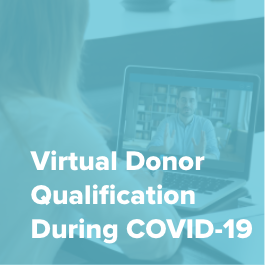At this point, the challenges of remote work are old news. But that doesn’t make them any less challenging. Amidst a global health crisis, it can feel inappropriate to be qualifying and soliciting donors, especially over the phone or Zoom.
However, the pandemic hasn’t made our fundraising missions any less important. In fact, some needs are even more pronounced than pre-pandemic. (How about student emergency funds or student relief funds? Listen to our recent RAISE Podcast about this.) We have to continue to advance the missions of our organization and aid students in any way we can using virtual qualification.
We must be considerate of donors’ situations and priorities during the pandemic, but we shouldn’t underestimate donors’ desire to support our students at this time. Here are our tips for virtual qualification in 2020 and beyond.
#1 Know your constituents.
We should all know how important keeping in touch with and understanding donors is. And that’s more true than ever. If an alumnus was laid off due to the pandemic, reaching out to solicit a gift probably isn’t the most appropriate interaction to have at this time. Instead, alumni relations shops should use this as an opportunity to steward donors, offer professional development opportunities, or try to connect donors with other alumni. We compiled our favorite stewardship ideas into this handy blog post.
But how will you know who has lost their job? Most of the information you need to keep up with alumni is already on LinkedIn. Or we could just compile it for you. With Career Moves by EverTrue, we’ll start off by updating all your alumni profiles with the latest available employment information. Then, we’ll keep them current by applying human-verified updates every 90 days so you can stay in touch with alumni as they shift careers and industries. Learn more about Career Moves.
Additionally, fundraisers that are used to traveling around the country to meet donors have more time on their hands than ever before. Use the time you’d usually spend waiting at airport gates to do research about your constituents. Make sure every outreach is personalized and specific to your donor.
#2 Be straightforward.
Say you’ve found a prospective donor you’d like to meet with and it’s time to reach out. UVA’s Adam Fentress believes that you should state exactly what you do for the university and why you’d like to meet with them. You might get less meetings this way, but you’ll get the right meetings.
Donors and prospective donors that have not been negatively affected by the pandemic may be more eager to give than ever, especially to help meet students’ immediate needs. So let them know that’s what you’re looking to talk about.
Being straightforward and transparent will optimize your time and your donors’ time while giving purpose to every virtual qualification meeting.
#3 Always have next steps.
This is a well-known best practice for salespeople, and it’s something that fundraisers could benefit greatly from. Do you ever find yourself following up with donors you’ve lost touch with and just “checking in”? That’s most likely because you didn’t establish next steps in your previous conversations.
Get an idea from donors about when they’d like to see an impact from their giving. Academic and athletic calendars set natural timelines for most initiatives. Use them. By focusing on the impact of giving, you’ll keep the end goal top of mind and keep the conversation going.
Wrap up calls or virtual meetings by establishing next steps and setting expectations with your donor that you’ll follow up within a certain time frame.
#4 Don’t be afraid to be told “No”.
The beauty of being told “no” during a virtual meeting is that you didn’t fly anywhere to be rejected! Every interaction with a current or prospective donor is an opportunity to build the relationship and learn something about your donor. Even if a donor says they aren’t interested in giving, connecting with them and sharing the priorities of your organization might just change their mind. And if not, they’ll still learn about the wonderful initiatives their Alma Mater has undertaken.
However, every “no” should be taken with a grain of salt. In fundraising, “no” often means “not right now” or that you haven’t uncovered what a donor is passionate about. Having open and candid conversations with prospective donors about their priorities (both long and short term) can uncover ways donors can support your organization that they were previously unaware of.
